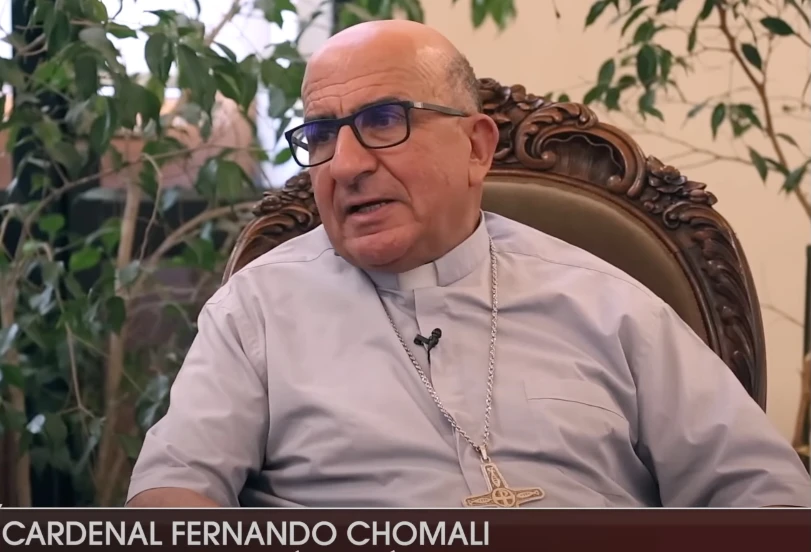ACI Prensa Staff, Aug 31, 2025 /
07:00 am
Cardinal Fernando Chomali, the archbishop of Santiago and primate of Chile, shared three stories that reflect cancel culture and highlighted the need to cultivate humility in times of mistrust and aggression.
The prelate was participating in an open meeting with students from the Catholic University of Chile, which took place at the San Joaquín campus and also featured professionals and academics.
The purpose of the event was to seek spaces for encounter, using dialogue as a transformative tool.
In his presentation, Chomali focused on dialogue, explaining that it does not involve renouncing one’s convictions but rather being willing to understand others from their own history and context: “When we stop listening, we also stop learning. Dialogue begins when we recognize that the other person has something to say to us that can enrich our lives.”
“Today, it seems there is no room for making mistakes or for forgiveness. This is a way of making the other person invisible. The challenge is to come out of ourselves, always recognize the dignity of the person, and embrace humility as a way to resolve conflicts,” he urged.
The cardinal told three stories that occurred during his time in the Archdiocese of Concepción, in which he had a “personal experience of cancellation” that helped him reflect.
“I arrived in Concepción as archbishop in 2011 and found the following situation: The churches were all leveled. The earthquake, which was terrible in that area, had just occurred,” he recounted.
Over time, he discovered that rebuilding buildings could be simpler than rebuilding social ties: “When it comes to managing materials, you round up the money. But when it comes to reaching an agreement, conversing, recognizing the other person’s dignity, asking for forgiveness and forgiving, things get much more complicated,” he acknowledged.
He went on to share three stories. The first had to do with a charitable project: “In Concepción, we carried out a very beautiful project, a laundry in which young people with Down syndrome could work. It was the only project of its kind in Latin America, and it had a lot of media impact. We didn’t advertise it, but it was so wonderful that it generated media interest,” he recalled.
But not everyone welcomed it: “A person on Facebook started insulting me harshly… It turned out that this woman owned a laundry a few blocks away and felt threatened. I explained to her that our project was nonprofit, funded by donors, and that in Concepción there were 700,000 people, 10 hospitals, 8,000 beds, millions of sheets and blankets.” In other words, there was work for everyone.
The archbishop proposed that the woman employ a person with Down syndrome and that her laundry become a second branch of the charitable project. “But she went away sad, because she wasn’t willing to do it. That’s how I understood that conflicts are often conversations that never happened or went badly,” he observed.
The second story involved a “more sensitive” subject, the cardinal admitted: “The Mapuche [Indigenous] community members on hunger strike were in prison serving their sentences. One of them, after a while, obtained permission to go out on Sundays and work. However, no one wanted to give him a job. His wife called me saying, ‘My husband is looking for work, and no one is hiring him.’ In other words, they were canceling him, denying him a basic right: to work, feed his family, and get back on his feet,” he explained.
The archbishop decided to help him, although it cost him dearly: “I welcomed him and gave him a job at a church home for homeless youth. But I was subjected to the worst cancellation: front-page news in Concepción for having given work to a person who was once in prison. I found this to be a really serious situation because it means we have lost confidence in the rule of law and, even more seriously, we have stopped believing that people can change, ask for forgiveness, or forgive themselves,” he reflected.
As a third story, Chomali offered some advice: “I always tell young people: study, study, and study. Because ignorance is a source of fanaticism. The most well-read people are capable of nuance, of dialogue. Those who are less well-read barricade themselves within their walls they put up and impose themselves with violence. And violence today manifests itself in a thousand ways: online, physically, symbolically.”
He therefore emphasized the importance of humility. “The greater the knowledge, the greater the humility; the less the knowledge, the less the humility. We dig in our heels for fear that others will break down the walls we put up,” he warned.
Finally, he focused on the power of the cancellation phenomenon: “Judgment today is no longer in the courts: It takes place in the media. And that judgment suspends one’s own thinking, because we follow what social media or the news media say.”
(Story continues below)
Subscribe to our daily newsletter
“We’ve seen artists canceled without proof, just based on rumors. This logic of destruction has done us a lot of harm. I think we should start by taking a look at ourselves: How do we mutually cancel each other out in our daily lives?”
“If we start there, perhaps we can change the way we relate to each other. Otherwise, tomorrow will be too late,” he said.
This story was first published by ACI Prensa, CNA’s Spanish-language news partner. It has been translated and adapted by CNA.


